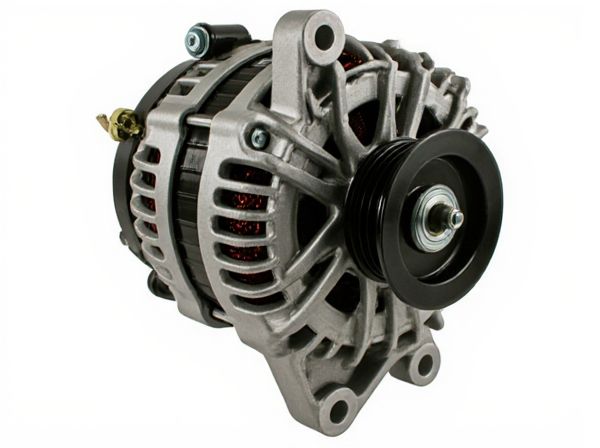
Photo illustration: OEM Fitment vs Universal Fitment
OEM fitment ensures that replacement parts match your vehicle's exact specifications, providing optimal performance and seamless integration. Universal fitment offers broad compatibility across multiple models but may require modifications, risking suboptimal fit or function. Choosing OEM fitment guarantees that your vehicle maintains its original engineering standards and reliability.
Table of Comparison
| Feature | OEM Fitment Alternator | Universal Fitment Alternator |
|---|---|---|
| Compatibility | Exact fit for specific vehicle make and model | Fits multiple vehicle types with adjustable mounting |
| Installation | Plug-and-play, minimal modification required | May require custom brackets and wiring adjustments |
| Performance | Meets original manufacturer specifications | Varies; may not match exact OEM output and durability |
| Warranty | Typically offers full OEM warranty coverage | Limited or generic warranty depending on brand |
| Cost | Higher price due to brand and fitment accuracy | More affordable, but with potential trade-offs |
| Durability | Designed for long-term reliability under OEM conditions | Varies widely, depends on manufacturer quality |
Introduction to OEM Fitment and Universal Fitment
OEM fitment refers to parts designed to meet the exact specifications and standards set by the original equipment manufacturer, ensuring compatibility and optimal performance for specific vehicle models. Universal fitment parts are crafted to fit a wide range of vehicles, offering flexibility but often requiring modifications for proper installation. Understanding the differences between OEM fitment and universal fitment is essential for selecting the right replacement parts that balance precision, cost, and ease of installation.
Definition of OEM Fitment
OEM fitment refers to parts designed specifically to match the exact specifications and dimensions of the original equipment manufacturer (OEM) for a particular vehicle model. These components ensure seamless integration, maintaining the vehicle's original performance, safety standards, and warranty compliance. OEM fitment contrasts with universal fitment, which includes parts designed to work across multiple models but may require modifications for proper installation.
Definition of Universal Fitment
Universal fitment refers to automotive parts or accessories designed to be compatible with a wide range of vehicle makes and models rather than tailored to a specific OEM (Original Equipment Manufacturer) specification. These components offer broader applicability, enabling installation across different vehicles without requiring exact match to factory dimensions or configurations. While universal fitment provides flexibility and cost-effectiveness, it may require adjustments during installation to achieve proper function and fit.
Key Differences Between OEM and Universal Fitment
OEM fitment ensures parts are designed specifically for a vehicle model, guaranteeing precise compatibility, optimal performance, and manufacturer standards. Universal fitment offers flexible installation across multiple vehicle types but may require modifications, risking fit issues or compromised function. Key differences include exact match and reliability for OEM versus wider applicability and potential adjustments for universal parts.
Advantages of OEM Fitment
OEM fitment ensures precise compatibility with vehicle specifications, maintaining original performance and safety standards. It guarantees seamless integration with existing components, reducing installation time and minimizing risks of malfunctions. Using OEM parts also preserves vehicle warranty and enhances resale value by supporting authentic maintenance.
Benefits of Universal Fitment
Universal fitment offers versatility by fitting a wide range of vehicle makes and models, reducing the need for multiple specific parts. This adaptability minimizes inventory costs for retailers and provides consumers with a cost-effective solution. Enhanced ease of installation and broad compatibility make universal fitment ideal for aftermarket upgrades and repairs.
Compatibility and Installation Considerations
OEM fitment ensures precise compatibility as parts are designed specifically for the vehicle make and model, guaranteeing exact alignment and performance. Universal fitment offers broader applications but often requires modifications during installation, such as adapters or adjustments, which can complicate the process. Choosing between OEM and universal depends on prioritizing seamless installation and guaranteed fit versus cost-effectiveness and flexibility across different vehicles.
Cost Comparison: OEM vs Universal Fitment
OEM fitment typically incurs higher costs due to precise engineering, original manufacturer standards, and guaranteed compatibility with specific vehicle models. Universal fitment options are generally more affordable as they are designed for broad compatibility but may require additional modifications or adjustments. Evaluating long-term expenses, OEM parts often reduce potential repair costs by ensuring perfect integration, whereas universal parts might lead to incremental costs from fitment issues or reduced performance.
Choosing the Right Fitment for Your Vehicle
Choosing the right fitment for your vehicle depends on whether you prioritize perfect compatibility or broader versatility. OEM fitment ensures parts match exact manufacturer specifications, guaranteeing seamless integration and optimal performance for your specific make and model. Universal fitment offers flexibility across multiple vehicle types but may require modifications, which can affect fit and function.
Conclusion: OEM or Universal Fitment—Which Is Best?
OEM fitment guarantees precise compatibility and optimal performance by matching the original equipment specifications, ensuring reliable installation and long-term durability. Universal fitment offers broader adaptability across various models but may require modifications, potentially compromising fit and function. Choosing OEM fitment is ideal for maintaining manufacturer standards and vehicle integrity, while universal fitment serves better for cost-effective solutions or unique customization needs.
 caratoz.com
caratoz.com